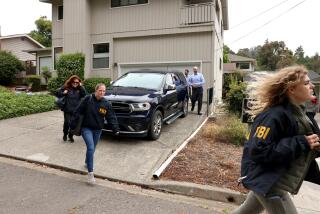Clinton Donor Riady Pleads Guilty to Conspiracy Charge
- Share via
WASHINGTON — James T. Riady, a longtime Indonesian friend of President Clinton who heads the worldwide Lippo banking group, pleaded guilty Thursday to conspiracy related to illegal campaign contributions in the 1996 Democratic fund-raising scandal and during the previous eight years.
Riady’s felony plea agreement, combined with LippoBank California’s plea to 86 misdemeanor charges, caps one of the longest-running investigations of the Justice Department’s campaign finance task force.
Under terms of the agreement, filed in federal court in Los Angeles and made public at Justice Department headquarters here, Riady will be sentenced to two years’ probation and will be prevented from entering the United States during that time--unless he is asked to testify before U.S. agencies. He also will be required to perform 400 hours of community service.
LippoBank California, one of the largest entities of the Lippo Group, which is owned by the Indonesia-based Riady family, will pay a fine of $8.6 million. That is the largest fine ever assessed in a campaign finance case, and Riady agreed to personally ensure the fine is paid.
Riady, 44, and his banking group acknowledged in court papers that they made millions of dollars in illegal campaign donations to Democratic presidential and congressional candidates dating to 1988, including hundreds of thousands of dollars to Clinton’s first campaign for the White House in 1992. There was no indication that any candidates knew the contributions were tainted foreign funds.
Former Democratic fund-raiser John Huang, a Glendale resident and onetime official of Lippo California, pleaded guilty in the scandal two years ago and cooperated in the case against Riady, who he said directed all political giving.
The plea agreement said that Riady, Huang and others “knowingly and willfully conspired and agreed to defraud the United States by impairing, obstructing and defeating the lawful functions and duties of the FEC [Federal Election Commission] through deceitful and dishonest means.”
Earl J. Silbert and Abbe Lowell, Riady’s Washington lawyers, released a statement that sought to minimize the plea bargain. They said that Riady’s felony plea was to “one charge of allowing inaccurate information to be provided to the Federal Election Commission.” And they add: “The charge relates to reimbursements of various political campaign contributions that were made or arranged by . . . John Huang.”
The lawyers added that “after a painstaking investigation that lasted three years and covered a wide range of allegations such as espionage and public corruption, the Department of Justice is filing no charges of any sort based on these serious allegations. Instead its allegation pertains solely to reimbursements for campaign contributions.”
Silbert and Lowell said that “Mr. Riady’s decision to enter into this plea agreement is totally voluntary and was made even though, as an Indonesian citizen, he is not subject to U.S. jurisdiction and even though there is no extradition treaty between the U.S. and Indonesia. . . . He is eager to put these issues behind him.”
Mochtar Riady, the family patriarch, and his son James have known Clinton for more than 20 years, since they were investors in a Little Rock, Ark., bank and Clinton was governor. During Clinton’s first term as president, James Riady visited the White House at least 20 times.
The Riadys helped place Huang at the Commerce Department in 1994 and then at the Democratic National Committee. As a DNC official, Huang helped raise $3.4 million from the Asian American community, more than half of which ultimately was returned because DNC officials could not verify that it came from legal, domestic donors.
The Riady family, its companies and their associates gave the Democratic Party more than $840,000 from 1992 through 1996.
Federal election law prohibits contributions by foreign corporations and noncitizens who live outside the United States, as Riady does. An overseas U.S. subsidiary may contribute to an election campaign only if it can show that the revenue was generated through its domestic operations.
Explaining why Riady directed money to Clinton and dozens of other Democratic candidates over the years, the court papers declared:
“Defendant Riady generally believed campaign contributions to be good for the reputation and business of Lippo Group and various Lippo entities, including defendant LippoBank California.”
The Riady family and its companies also were connected to Clinton friend and onetime Associate Atty. Gen. Webster L. Hubbell. One of the companies controlled by James Riady made a $100,000 payment to Hubbell, who after leaving the Justice Department under an ethics cloud served 18 months in federal prison for defrauding the Rose Law Firm of Little Rock when he and Hillary Rodham Clinton were partners there.
Hubbell was retained by Riady’s company in June 1994 within days of White House meetings among Riady, Huang and Clinton. Republican congressional investigators alleged that payments to Hubbell from the Riadys and other Clinton allies was “hush money” intended to keep Hubbell from incriminating the Clintons in the Whitewater investigation.
Former independent counsel Kenneth W. Starr suggested that Hubbell’s refusal to cooperate with the Whitewater investigation was related to consulting fees he received from companies contacted by Clinton associates. But the Clinton confidants said they lined up the consulting jobs for Hubbell only to help him and no one proved otherwise.
After the federal investigation of campaign finance abuses began in late 1996, Riady chose to remain in Jakarta.
GOP congressional investigators also sought to link political donations to Clinton’s 1996 campaign to Chinese intelligence agencies. But the Lippo Group has long denied any such connection on its part. And federal court papers did not allege any link.
Suspicions of such a link flourished because the Jakarta-based conglomerate has had a major presence in Hong Kong and a growing one in mainland China.
Court documents detailed a series of schemes by which Lippo Group often wired funds to LippoBank California for disbursement to political campaigns. Lippo employees were given cash to hand to campaign managers, sometimes in amounts as large as $20,000.
Huang told the FBI, for example, that he helped raise $700,000 for Clinton’s first campaign through such an illegal conduit scheme approved by Riady. In 1992, according to Huang, Riady promised to raise $1 million for Clinton while riding in a limousine with him.
The community service requirement of Riady’s sentence, a standard element of some plea agreements, may mean little in his case. He can perform the service either in Jakarta or in this country if he chooses to return after two years, but there appears to be no method for enforcing the requirement.
Justice Department officials were pleased with the plea agreement because Riady has remained in Indonesia since 1996--beyond the reach of U.S. subpoenas--even though he owned a home in the Los Angeles suburb of Brentwood until recently.
More to Read
Get the L.A. Times Politics newsletter
Deeply reported insights into legislation, politics and policy from Sacramento, Washington and beyond. In your inbox twice per week.
You may occasionally receive promotional content from the Los Angeles Times.










